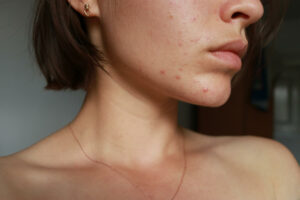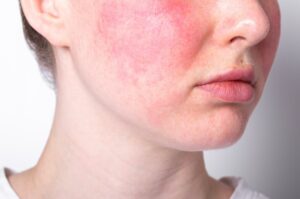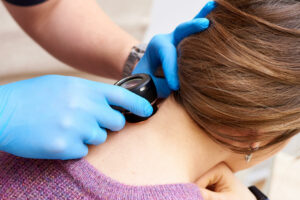Learn how to get rid of the springtime itch caused by a common skin condition
If you start noticing rough, scaly, bumpy or discolored patches of skin that you can barely resist scratching, you’re not alone. The American Academy of Dermatology Association reports that 1 in 4 people in the United States have what they consider a skin “disease.” (While that sounds severe, the list includes conditions ranging from acne to eczema to autoimmune skin conditions.)
Why are so many of us affected with skin issues? The skin is the body’s largest organ, and because it’s between our insides and what’s outside (the environment), it can be affected by both external and internal factors. Much like having an upset stomach, a rash can be the sign of many things.
One Common Cause of Red, Itchy Skin
One common inflammatory condition is eczema.
“If you see rough, inflamed, itchy patches of skin, it could be eczema,” says Erin McGee, Nurse Practitioner at Golden State Dermatology, Manteca. “It’s very common and can happen at any age.” Eczema can show up as rashes on or around the face, scalp, trunk or extremities. For those with darker skin, it may show up as discoloration that can last, even after the symptoms are gone.
The Scent of Spring Could Signal a Rash
Because your skin is in contact with both your body and the environment, many different things can cause inflammation. It could be something you ate, something you touched, or something you’re breathing in – like pollens. “With more pollens in the air and more grasses coming back to life, we see an increase in environmental allergens as the weather warms up in spring, especially in the Central Valley,” said McGee. “You may think of rashes coming from contact, but in fact air-borne allergens can cause reactions that show up in the skin.”
5 Ways to Treat Skin Inflammation
It’s almost impossible to avoid scratching an itch, so even if you’re not sure the rash you have is eczema, start treatment early before the condition gets worse or you run into complications.
- Add Moisture: To relieve dryness and provide a barrier for your skin against environmental allergens and other irritants, you’ll want to moisturize your skin. The National Eczema
Association recommends moisturizers (creams are more effective than lotions) like CeraVe®, Eucerin® Eczema Relief Cream, Vanicream® and Aveeno®. The best time to moisturize is right after a shower and it is important to bathe in lukewarm water with a gentle cleanser. - Add Medication: An oral, non-sedating antihistamine (e.g., cetirizine, loratadine, fexofenadine) can help minimize itch as well as target allergy symptoms.
- Topical Targets the Spot: You can get itch relief from applying topical treatments. Look for products designed specifically for itchiness that contain agents such as hydrocortisone,
pramoxine (e.g., CeraVe Itch Relief®) or menthol (e.g., Sarna®). - Update Your Plate: The foods you eat can be just as helpful (or hurtful) as medication. Certain foods cause inflammation. “To reduce inflammation, see if you can cut back on
added sugars, alcohol, refined carbohydrates, fried foods, processed meats, and saturated fat,” McGee says. If you want to add anti-inflammatory foods – a good idea at any time – increase foods like fruits, green leafy vegetables, fatty fish, and olive oil. - Move Your Body: Beyond what you eat (or don’t), see if you can add physical activity. “Low impact movement can reduce stress, like walking or yoga,” McGee says. Decreasing stress
can also decrease systemic inflammation. Mindfulness and meditation are other ways to manage stress, which will not only benefit your skin, but your health overall.
Bottom Line: When in Doubt, Ask Your Dermatologist
With any kind of skin condition, don’t rely on your own diagnosis or photos from a website. While eczema is common, so are many other conditions. Dermatologists at Golden State Dermatology treat many common inflammatory conditions of the skin such as psoriasis, acne, allergic reactions, and autoimmune skin diseases. “The skin can be a signal,” said McGee. “You want to find out if your reaction is the sign of something else, or if it’s benign. Either way, you’ll want to get the right treatment.”
We all want to enjoy the spring – rash-free!






